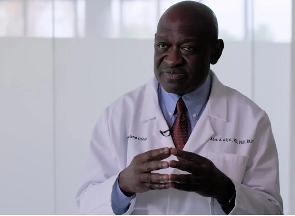Eighty-two per cent of men with prostate cancer in Ghana die annually, Professor Alex Adjei, Chair, Taussig Cancer Institute, United States, has said.
He said this indicated that the mortality rate of prostate cancer in the country was higher than deaths related to breast and cervical cancers.
Prof Adjei said this at an annual public lecture on cancer, organised by the Soroptimist International Club of Accra, at the British Council, on the theme: “How Can We Stop Deaths from Prostate Cancer?”
He said this was a worrying situation because comparing Ghana to other countries, such as the US and the UK, they recorded more cases of prostate cancer annually, but had lower mortality rates, while the majority survived.
Prof Adjei said comparatively, Ghana, which had three times lower incidence of prostate cancer rate, however, had higher mortality compared to those countries due to late reporting.
He said it was thus important for men to have annual and regular checks to enable them to catch it early to prevent deaths.
Prostate cancer occurs in the prostate. The prostate is a small walnut-shaped gland in males that produces the seminal fluid that nourishes and transports sperm.
The disease in its early stage may cause no symptoms but in its advanced state, men could experience trouble urinating, decreased force in the stream of urine, blood in the urine, blood in the semen, bone pain, loss of weight without trying, and erectile dysfunction.
The disease only kills when the cancer has spread to other parts of the body.
Prostate cancer is the second most common cancer in men worldwide and the overall fourth most common cancer.
It is estimated that 1.4 million cases and 375,304 deaths were recorded in 2020.
Prof Adjei said men with a higher risk of getting prostate cancer, which included African men and men with a family history of the disease, should talk to their doctors at age 40 and above.
“This is necessary because such men may harbour aggressive prostate cancer, which if not treated early, would reach an advanced stage”, he added.
He explained that research indicates that young men are not off the hook of getting prostate cancer, therefore, it is important that they eat healthily, exercise regularly and do annual Prostate Specific Antigen (PSA) and Digital Rectal Exam (DRE) check-ups when they turn 50.
Prof Adjei explained that to prevent prostate cancer deaths it was important that men prevented the disease.
He advised spouses to support and care for men with the ailment for them to go through the treatment stages successfully.
Dr. Bernard Toboh, a Urologist, Korle-Bu Teaching Hospital, during a panel discussion, described prostate cancer as “having no respect for persons” and thus called for sensitization to ensure people were duly educated.
Dr. Adrian Oddoye, General Practitioner, Akai House Clinic, also encouraged more screening and advised doctors to ensure their patients did their checks.
Ms Karen Korsa-Amarteifio, the President of Soroptimist International Accra Club, said the 2023 lecture sought to create the needed awareness on prostate cancer following the increased rate of deaths recorded in the country.
The club, over the years, has been organising such lectures to educate the public, specifically on cancers but had to put it on hold due to the COVID-19 pandemic.
Questions asked by the participants focused on what one needed to do when the PSA was not within range, support required of caregivers, and foods to eat to prevent prostate cancer, among others.
The event saw a fundraising to enable the group to purchase a food warmer for the pediatric oncology unit.
Soroptimist International is a worldwide organisation of professional women from all disciplines, working together to enhance the education and status of women and girls, as well as the professional and leadership roles of women.
It was founded in 1921 as a global volunteer service for women. It has nearly 72,000 members in 121 countries worldwide.
Health News of Thursday, 4 May 2023
Source: GNA
82% of men with prostate cancer in Ghana die annually
Entertainment
















